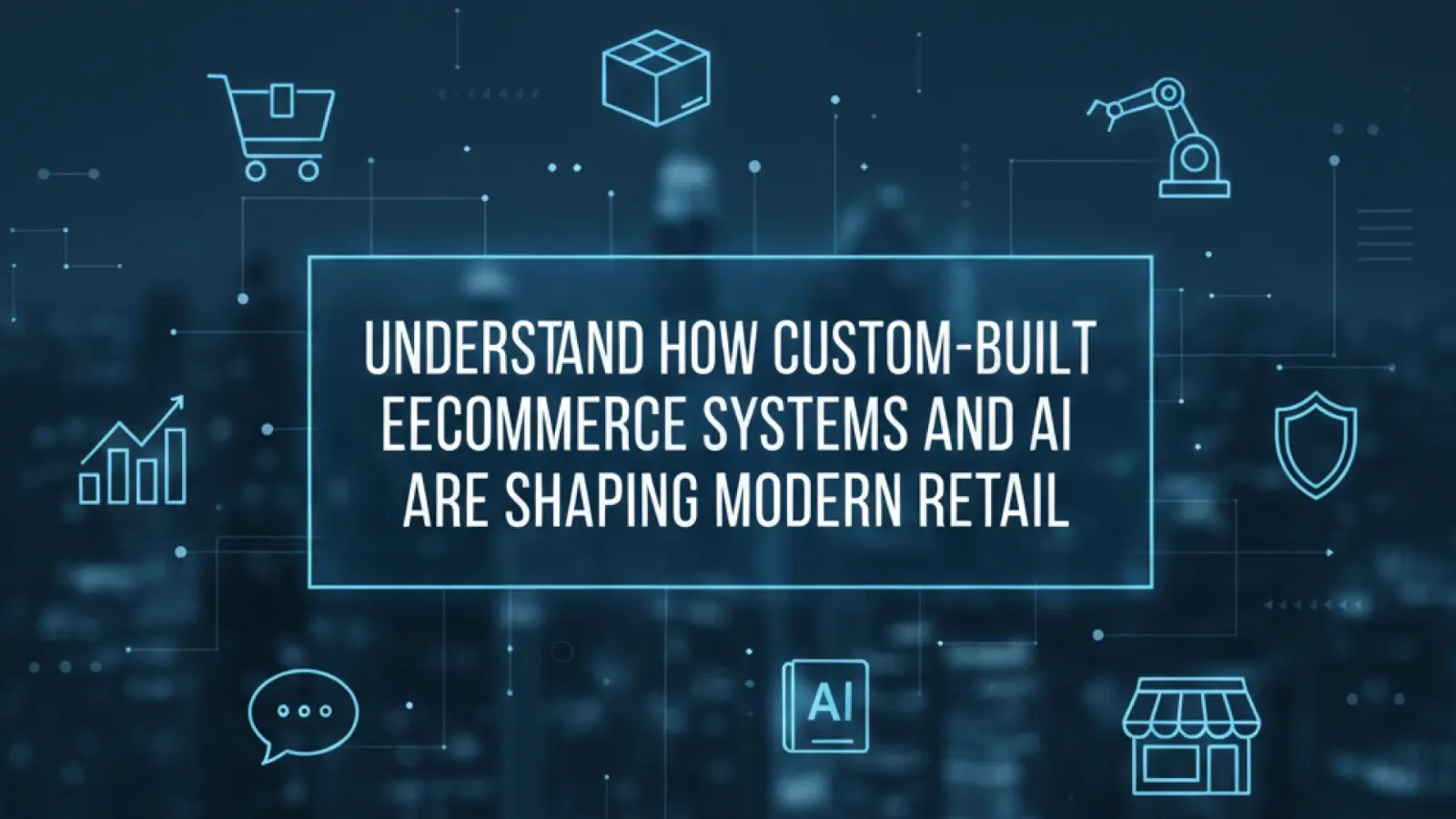


Customers expect speed, accuracy, and relevance. Online shopping stores on generic platforms fall short. More brands now build their own platforms and add AI. The result is a store that fits the business and its customers.
Custom systems remove obstacles at key moments like search, checkout, and returns. Inventory stays in sync with orders and reorders run automatically. AI surfaces the right products, forecasts demand, and flags suspicious orders. Support teams use the same data so they respond faster and make fewer mistakes. Teams replace guesswork with clear metrics and repeatable processes. IR Solutions outsources ecommerce developers to build custom ecommerce platforms using the latest AI technologies. They streamline operations and improve the customer experience for any business.
Ready-made platforms work for quick launches but custom ecommerce systems provide product pages, checkout, and payments out of the box. They stop being ideal when rules get complex.
Stores may need special checkout rules for different markets, local tax handling, or unique catalog logic. Plug-in modules fail at scale.
Custom systems match the way a business operates. They reduce manual work and repeated fixes. Teams control data and changes, which matters as the business grows.
AI does more than automate tasks. It finds patterns in orders, traffic, and returns. Inside a custom ecommerce system, it works on live data across checkout and inventory, reducing delays and errors.
AI can suggest products, spot fraud, create product text, and forecast demand more accurately than simple rules.
Personalization now uses session behavior, past purchases, and context. Models rank thousands of items in seconds, so customers see fewer irrelevant products.
Good personalization makes the site easier to use. It increases conversions and repeat purchases. Messaging stays consistent across email, push, and ads.
Within a custom ecommerce system, AI forecasting mixes sales history with seasonality and promotions. It predicts demand for each SKU better than simple rules.
Predictions help plan warehouse space, staff, and reorder timing. Reorder points can update automatically. This saves time and lowers holding costs.
Dynamic pricing moves with demand, stock, and competition. It does not mean random changes. Within a custom-built ecommerce platform, AI recommends adjustments within safe rules.
Models track sales velocity and stock. They check costs and competitor moves. Then they suggest a price that meets margin rules.
Pricing logic inside the platform lets teams set limits that match brand and margin goals.
Support grows with traffic. AI handles routine queries and adds context to complex ones. That reduces handling time and repeated messages.
Support tools show agents the full order history. They respond faster with fewer mistakes.
Fraud changes quickly. Rules alone fall behind. Models watch device patterns, shipping behavior, and refunds. Suspicious transactions are flagged for review.
Teams control review workflows and risk tolerance. Fraud stays low without blocking valid buyers.
Slow sites cost sales. Custom systems let engineers optimize key paths. They cache stable content and move heavy jobs off the request path.
AI does more than automate simple tasks. It finds patterns in orders, traffic, and returns. When AI runs within a custom ecommerce architecture, it acts on live data flowing through checkout, inventory, and customer modules.
That tight integration reduces delays and errors.
Retail uses many tools. Payments, shipping, inventory, and ERP all feed the store. A custom platform becomes the single source of truth.
APIs and event-driven updates keep systems in sync. That reduces manual fixes and data drift.
Personalization uses customer data, so privacy must be respected. Retailers should be clear about what data they collect and give customers options to manage it.
Models can reflect bias from data. Audits and human checks reduce unfair outcomes. Privacy and fairness protect brand value.
Track outcomes, not vanity metrics. Focus on conversion rate, average order value, repeat purchase rate, and churn rate.
For operations, track stockouts, fulfillment time, and holding cost. For support, track resolution time and satisfaction.
Models need metrics too. Measure accuracy and impact. Small improvements in search or recommendations can move key business metrics.
Technology matters, but people make it work. Teams that combine product experts, engineers, and data specialists move faster. IR Solutions ecommerce developers can join your team to build and maintain custom platforms, implement AI tools, and keep projects on track.
Roles that add value:
Developers build and maintain the platform
Data engineers clean and prepare data
Data scientists design and measure models
Product managers connect work to business goals
Operations staff review outputs to match real-world needs
Ecommerce systems hold payment and personal data. Security must start in the design.
Use encryption, limit access, and log actions. Remove or anonymize personal identifiers used in models. Regular checks reduce exposure and keep compliance strong.
Custom ecommerce systems with AI give retailers control and room to grow. They cut waste, reduce manual fixes, and make shopping faster and clearer. Teams make faster data-driven choices. Clarity improves product discovery, lowers costs, and helps all parts of retail run smoothly.
Start small. Fix data first and test with real signals. Measure what matters, like conversion rate, average order value, and repeat buyers. Protect customer data and review model outputs for fairness and privacy. Scale only after results are proven and repeatable.